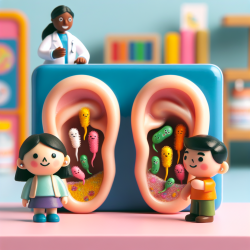Introduction: The Probiotic Revolution in Ear Health
Chronic suppurative otitis media (CSOM) presents a significant challenge in pediatric health, often leading to hearing impairments and affecting speech and language development. Traditional treatments, primarily antibiotics, face hurdles like antibiotic resistance. Enter probiotics, specifically Lactobacillus plantarum, a potential game-changer in managing ear infections.
Understanding the Research: Probiotics and Ear Health
Recent research conducted using a chinchilla animal model has explored the safety of transtympanic application of Lactobacillus plantarum. The study aimed to determine whether this probiotic could be safely applied to the ear without causing ototoxicity. The results were promising, showing no significant long-term hearing loss or vestibular dysfunction.
Key Findings and Implications
- The study involved ten chinchillas, with one ear receiving the probiotic and the other saline.
- Auditory brainstem responses (ABR) were measured, showing no significant differences in hearing thresholds after 28 days.
- No histological evidence of damage to auditory hair cells was observed.
These findings suggest that Lactobacillus plantarum is a safe candidate for further research in treating CSOM, particularly given its ability to inhibit pathogens like S. aureus and P. aeruginosa.
Why This Matters for Practitioners
For practitioners, these insights open new avenues for non-antibiotic treatments for ear infections, potentially reducing the risk of antibiotic resistance and improving outcomes for children. Implementing probiotics in therapeutic settings could enhance the efficacy of treatments for CSOM.
Encouraging Further Research
While the study provides preliminary evidence of safety, more extensive research is needed to confirm these findings in human models. Practitioners are encouraged to stay informed about ongoing research and consider participating in clinical trials to further explore the therapeutic potential of probiotics in ear health.
Conclusion: A Step Towards Better Outcomes
Probiotics, particularly Lactobacillus plantarum, offer a promising alternative in the treatment of CSOM. By incorporating data-driven approaches and evidence-based practices, practitioners can contribute to better health outcomes for children.
To read the original research paper, please follow this link: Safety of transtympanic application of probiotics in a chinchilla animal model.










